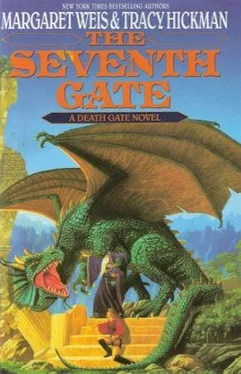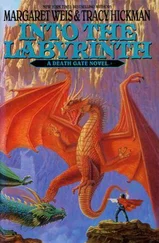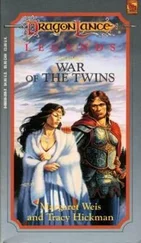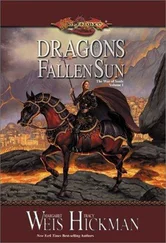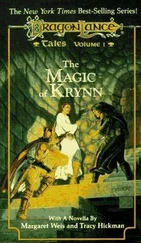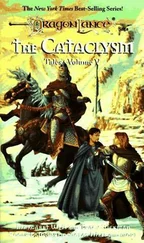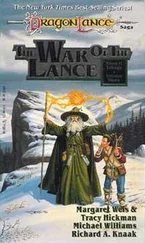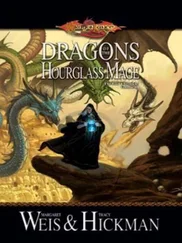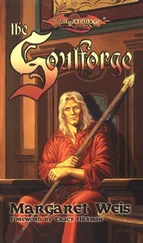Margaret Weis - The Seventh Gate
Здесь есть возможность читать онлайн «Margaret Weis - The Seventh Gate» весь текст электронной книги совершенно бесплатно (целиком полную версию без сокращений). В некоторых случаях можно слушать аудио, скачать через торрент в формате fb2 и присутствует краткое содержание. Жанр: Фэнтези, на английском языке. Описание произведения, (предисловие) а так же отзывы посетителей доступны на портале библиотеки ЛибКат.
- Название:The Seventh Gate
- Автор:
- Жанр:
- Год:неизвестен
- ISBN:нет данных
- Рейтинг книги:3 / 5. Голосов: 1
-
Избранное:Добавить в избранное
- Отзывы:
-
Ваша оценка:
- 60
- 1
- 2
- 3
- 4
- 5
The Seventh Gate: краткое содержание, описание и аннотация
Предлагаем к чтению аннотацию, описание, краткое содержание или предисловие (зависит от того, что написал сам автор книги «The Seventh Gate»). Если вы не нашли необходимую информацию о книге — напишите в комментариях, мы постараемся отыскать её.
The Seventh Gate — читать онлайн бесплатно полную книгу (весь текст) целиком
Ниже представлен текст книги, разбитый по страницам. Система сохранения места последней прочитанной страницы, позволяет с удобством читать онлайн бесплатно книгу «The Seventh Gate», без необходимости каждый раз заново искать на чём Вы остановились. Поставьте закладку, и сможете в любой момент перейти на страницу, на которой закончили чтение.
Интервал:
Закладка:
“Perhaps,” Ramu said, but would add nothing further. He knew, because his father had told him before he left, that the dragon-snakes had entered Death’s Gate, had left Chelestra, taken their evil to other worlds . . .
. . . “This is my fault, my son,” Samah said. “One reason I travel to Abarrach is in hopes of making reparation, of finding the means to destroy the dread serpents. I begin to think”—he hesitated, glanced at his son from beneath lowered eyelids—“I begin to think that Alfred was right all along. The true evil is here. We created it.”
His father placed his hand over his own heart.
Ramu did not understand. “Father, how can you say that? Look at what you created! It is not evil.”
Ramu gestured, a broad and sweeping motion that included not only the buildings and ground and trees and gardens of the Chalice, but the world of water itself, and beyond that, the worlds of air and fire and stone.
Samah looked where his son had pointed. “I see only what we destroyed,” he said.
Those were his last words, before he walked through Death’s Gate.
“Farewell, my father,” Ramu called after him. “When you return triumphant, with legions marching behind you, your spirits will lift.” . . .
But Samah had not returned. And there had been no word of him.
And now, though Ramu was loath to admit it, the mensch had—to all intents and purposes—conquered the gods. Conquered us! Their superiors! Ramu could see no way out of the present difficulty. Since the floodgates were under the magic-nullifying water, the Sartan could not destroy the floodgates with magic. We might resort to mechanical means. In the Sartan library are books which tell how, in ancient days, men manufactured powerful explosive devices.
But Ramu could not fool himself. He lifted his hands, turned them palm up, stared at them. The palms were soft and smooth, the fingers long and shapely. A conjurer’s hands, taught to handle the insubstantial. Not a craftsman’s. The clumsiest dwarf could manufacture in an eyeblink what it would take Ramu long hours of toil to produce with nothing but his hands.
“We might, after cycles and cycles, produce something mechanical capable of closing or blocking off the floodgates. But at that point we have become mensch,” Ramu said to himself. “Better to just open the floodgates and let the water rush in!”
It was then that the thought occurred to him. Perhaps we should leave. Let the mensch have this world. Let them look after themselves. Let them destroy each other, as—so Alfred had reported—the mensch were doing on other worlds.
Let the unruly and ungrateful children come home to find that their long-suffering parents have gone.
He was suddenly conscious of the other Council members exchanging glances, their expressions anxious, worried. He realized, too late, that his dark thoughts had been reflected on his face. His expression hardened. To leave now was to give up, surrender, admit defeat. He would sooner drown in that blue-green water.
“Either the mensch abandon the Chalice or agree to place themselves under our control. Those are their only two options. I assume the rest of the Council agrees with me?” Ramu glanced around.
The rest of the Council did agree, at least by voice. Any disagreement or dissent was not spoken aloud. This was no time for disunity.
“If the mensch refuse to meet these terms,” Ramu continued, frowning, speaking slowly and distinctly, his gaze fixing in turn on each person in the room, “there will be consequences. Dire consequences. You may tell them that.”
The Council members appeared more hopeful, relieved. Obviously, their Councillor had a plan. They delegated one of their number to speak to the mensch, then moved on to other business, such as cleaning up damage left by the floodwaters. When there were no other matters left to consider, the Council voted to adjourn. Most of them went about their business, but a few lingered behind, talking with Ramu, hoping to discover some hint of what the Councillor had in mind.
Ramu was expert at keeping his own counsel. He gave away nothing, and the other Council members at length departed. Ramu remained seated at the table, glad to be alone with his thoughts, when he suddenly realized he wasn’t alone.
A strange Sartan had entered the room.
The man looked familiar, but was not immediately recognizable. Ramu regarded him intently, trying to place him. Several hundred Sartan lived on the Chalice. A good politician, Ramu knew them all by sight and could generally put a name to a face. It disturbed him that he couldn’t remember this one. Yet he was positive he’d seen this man before.
Ramu rose politely to his feet. “Good day, sir. If you have come to present a petition to the Council, you are too late. We have adjourned.”
The Sartan smiled and shook his head. He was a man of middle age, handsome, with a receding hairline, strong jaw and nose, sad and thoughtful eyes.
“I come in time, then,” the Sartan said, “for I have come to talk to you, Councillor. If you are Ramu, son of Samah and Orlah?”
Ramu frowned, annoyed by this reference to his mother. She had been exiled for crimes against the people; her name was never to be spoken. He was about to make some comment on this when it occurred to him that perhaps the strange Sartan (what was his name!) did not know of Orlah’s exile to the Labyrinth, in the company of the heretic Alfred. Gossip had undoubtedly spread the word, but, Ramu was forced to admit, this dignified stranger did not look the type to indulge in whispers over the back fence.
Ramu bit back his irritation, made no comment. He answered the question with a slight emphasis that should have given the stranger a clue. “I am Ramu, son of Samah.”
At that point, Ramu was faced with a problem. Asking the man’s name was not a politic move, would reveal that Ramu did not remember him. There were diplomatic ways around this, but—being generally a blunt and forthright man—Ramu could think of none at the moment.
The strange Sartan, however, settled the matter. “You don’t remember me, do you, Ramu?”
Ramu flushed, was about to make some polite reply, but the Sartan went on.
“Not surprising. We met long, long, long ago. Before the Sundering. I was a member of the original Council. A good friend of your father’s.”
Ramu’s mouth sagged open. He did remember now ... in a way. He remembered something disquieting in regard to this man. But what was of more immediate interest was the fact that this Sartan was obviously not a citizen of Chelestra. Which meant he had come from another world.
“Arianus,” said the Sartan with a smile. “World of air. Stasis sleep. Much like you and your people, I believe.”
“I am pleased to know you again, sir,” Ramu said, trying to clear his confusion, recall what he knew about this man, and, at the same time, revel in the newfound hope the stranger brought. There were Sartan alive on Arianus!
“I trust you will not be insulted, but it has been, as you say, a long time. Your name . . .”
“You may call me James,” said the Sartan.
Ramu eyed him distrustfully. “James is not a Sartan name.”
“No, you’re right. But as a compatriot of mine must have told you, we on Arianus are not accustomed to using our true Sartan names. I believe you have met Alfred?”
“The heretic? Yes, I’ve met him.” Ramu was grim. “I think it only fair to warn you that he was exiled . . .”
Something stirred in Ramu, a distant memory, not of Alfred. Further back, much further back in time.
He had almost grasped it, but before he could lay hands on the memory, the strange Sartan unraveled it.
James was nodding gravely. “Always a troublemaker, was Alfred. I’m not surprised to hear of his downfall. But I didn’t come to speak of him. I came on a far sadder mission. I am the bearer of unhappy news and evil tidings.”
Читать дальшеИнтервал:
Закладка:
Похожие книги на «The Seventh Gate»
Представляем Вашему вниманию похожие книги на «The Seventh Gate» списком для выбора. Мы отобрали схожую по названию и смыслу литературу в надежде предоставить читателям больше вариантов отыскать новые, интересные, ещё непрочитанные произведения.
Обсуждение, отзывы о книге «The Seventh Gate» и просто собственные мнения читателей. Оставьте ваши комментарии, напишите, что Вы думаете о произведении, его смысле или главных героях. Укажите что конкретно понравилось, а что нет, и почему Вы так считаете.
